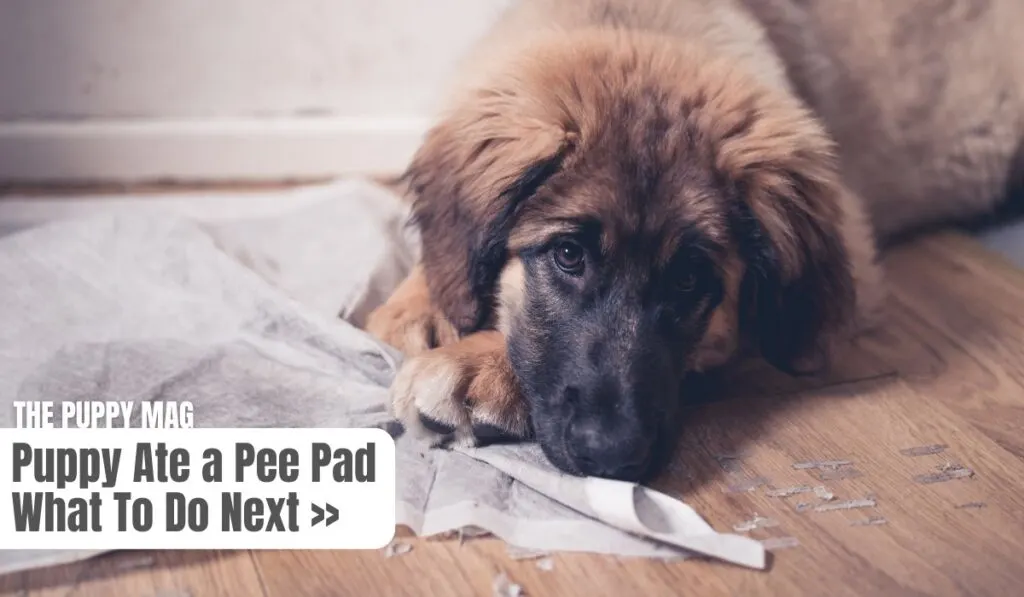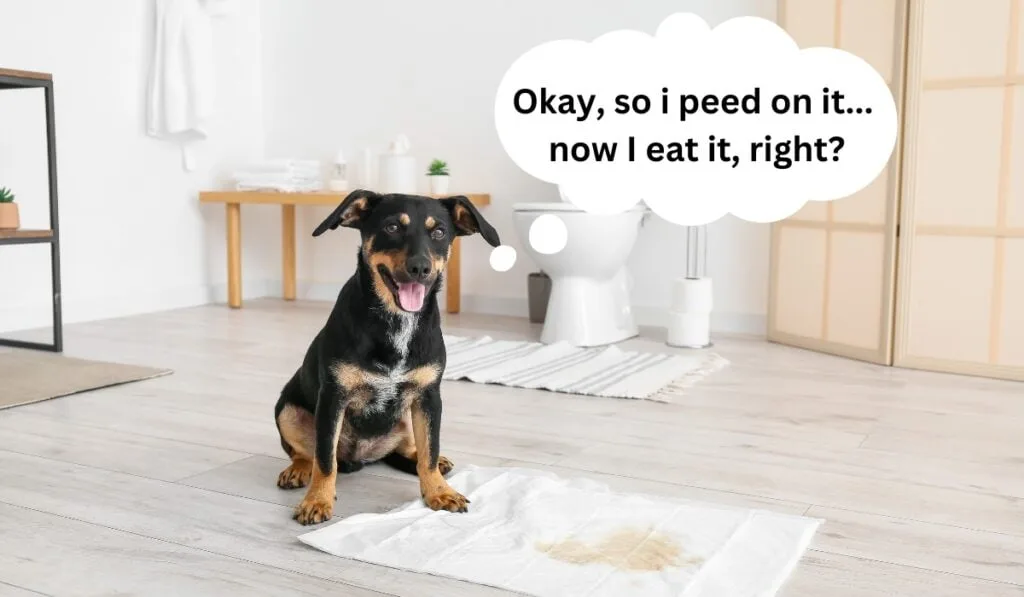Yep, if it’s anything like my situation, you’ve likely come home to find the pee pad ripped up and your pup chomping away like it’s a prime piece of steak. Oh dear…
You’re instantly worried and wondering if your puppy has just consumed some of the actual pee pad. And if so, what to do next.
I’ve dealt with this situation before and have talked to many owners over the years about this exact issue. We’ve also covered this with our resident veterinarian here at The Puppy Mag.
In this article:
➡️ Is it dangerous for a puppy to eat a pee pad
➡️ What to do when your puppy eats a pee pad
➡️ When to seek veterinary help
➡️ Why puppies eat pee pad
➡️ Tips for stopping this behavior in the future

Is it dangerous for puppies to eat pee pad?
I don’t want you to panic, but it’s important to know that, yes, it can potentially be very dangerous for a puppy to eat a pee pad.
Why is this?
Pee pads are made of materials that can potentially cause blockages in a puppy’s digestive system.
The following dangers may occur:
Choking Hazard:
Pee pads are not designed to be ingested, so if your puppy eats a piece of the pad, it can cause choking. The pee pad can obstruct your puppy’s airway, making it difficult for them to breathe.
Blockages:
Pee pads are made of absorbent materials that can clump together in your puppy’s digestive system, causing blockages. If your puppy has eaten a large piece of the pad, it can cause a blockage that requires surgical intervention. Signs of a blockage include vomiting, diarrhea, loss of appetite, and abdominal pain.
Intestinal Damage:
Pee pads can cause damage to your puppy’s intestinal lining. The absorbent materials in the pad can cause irritation, inflammation, and even perforation of the intestinal walls.

What to do next if your puppy eats a pee pad (or part of one)
If you suspect that your puppy has eaten a pee pad, take the following steps immediately:
Stay calm & assess the situation:
It’s important to stay calm to properly assess the situation.
If you are sure your pup has consumed A LOT of pee pad (a handful size), or an entire pee pad, then waste no time in contacting your veterinarian.
If you think they’ve only consumed a tiny amount (a few very small clumps) then it’s likely nothing to panic about and this will pass through your puppy’s system.
Of course, that is hard to determine, so you must monitor your puppy and their behavior carefully, and be ready to contact your veterinarin should they start reacting badly.
Remove existing pieces from your puppy’s mouth:
In this situation your puppy might have more pee pad currently stuck in their mouth or jowls. So it’s important to open their mouth and remove this as quickly but calmly as possible.
Monitor your puppy:
Keep a very close eye on your puppy for any signs of distress, such as vomiting, diarrhea, or loss of appetite.
If your puppy seems to be in pain, whimpering, or has a swollen belly, it’s time to take them to the vet.
Contact your veterinarian:
Call your veterinarian and explain the situation. They will likely recommend bringing your puppy in for an examination.
Depending on the severity of the situation, they may suggest giving your puppy medication to help them pass the pee pad, or they may need to perform surgery to remove the blockage in the most severe cases.
Prevent access to pee pads:
Remove any remaining pee pads/ripped up pee pads from your puppy’s environment to prevent further consumption. If your puppy has a tendency to chew on inappropriate items, keep them in a crate or playpen when you can’t supervise them.
Encourage drinking:
If only a little pee pad is consumed it’s important to encourage them to drink. This will help their digestive system handle this foreign material.
To encourage drinking you could put a small amount of meat broth into the water.
When to seek veterinarian help
If your puppy shows any signs of distress or discomfort after eating a pee pad, seek veterinary help immediately.
Signs to look out for include:
Vomiting: If your puppy vomits up parts of the pee pad, it could be a sign that they have eaten too much of it.
Diarrhea: Pee pads can cause irritation in your puppy’s digestive system, leading to diarrhea.
Loss of Appetite: If your puppy has eaten a pee pad, they may feel full and not want to eat. This can lead to malnutrition and other health problems.
Abdominal Pain or Discomfort: Your puppy may show signs of discomfort, such as whining or crying, if they have a blockage or intestinal damage.
Lethargy: If your puppy seems lethargic or tired, it could be a sign that they are not feeling well.
Likely reasons why your puppy ate a pee pad
In an emergency the reason behind why your puppy ate the pee pad isn’t important. But once the hecticness of this situation calms down, it’s important to consider the reasons behind why your pup decided to eat the pee pad in the first place.
Puppies are curious creatures and may eat a pee pad for various reasons, including:
Teething: Puppies chew on things to relieve the discomfort of teething. Make sure your puppy has plenty of chew toys to keep them occupied.
Boredom: Puppies can become bored and look for things to chew on. Make sure your puppy has plenty of exercise and mental stimulation to keep them entertained.
Hunger: If your puppy is hungry, they may look for things to eat, including pee pads. Make sure your puppy is on a regular feeding schedule and has access to plenty of fresh water.
Separation Anxiety: Some puppies may eat pee pads as a result of separation anxiety. If you suspect this is the case, try to gradually acclimate your puppy to being alone for short periods of time.
The truth is, many of these causes can be influenced by us if we provide our pups with a sufficiently stimulating routine, and avoid leaving them alone for too long. Let’s explain this in further detail below.
How to prevent this from happening again
Preventing your puppy from eating pee pads is essential to their health and safety. Here are some tips to prevent this from happening in the future:
Supervise Your Puppy: Keep a close eye on your puppy when they are out of their crate or playpen. If you notice them chewing on something they shouldn’t be, redirect their attention to a chew toy or bone.
Keep Pee Pads out of Reach: Store pee pads in a location that is out of reach of your puppy. Consider using a baby gate or keeping the pads in a closed cabinet.
Provide Plenty of Chew Toys: Make sure your puppy has plenty of chew toys to keep them occupied. Toys that can be filled with treats or frozen can be especially helpful in keeping your puppy entertained.
Establish a Routine: Establishing a routine for your puppy can help prevent boredom and anxiety. Make sure your puppy has regular feeding times, exercise, and playtime.
Last thoughts
Eating a pee pad can be a potentially dangerous situation for your puppy.
If you suspect that your puppy has eaten a pee pad, monitor them closely and contact your veterinarian immediately.
To prevent this from happening in the future, supervise your puppy, provide plenty of chew toys, and establish a routine for them.
With proper care and attention, you can keep your puppy safe and healthy.
